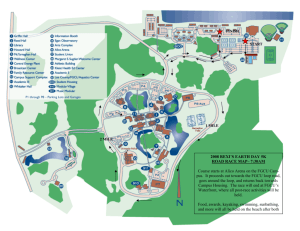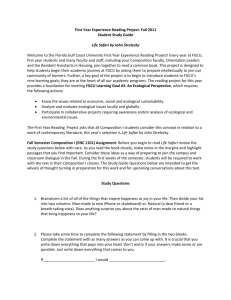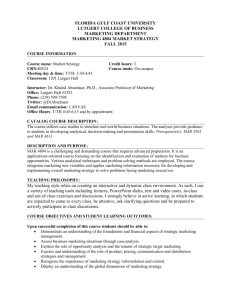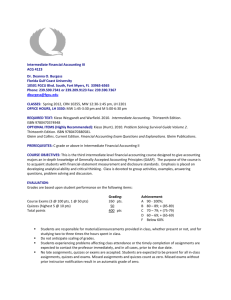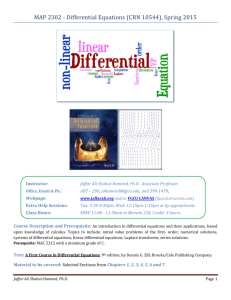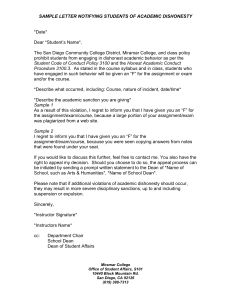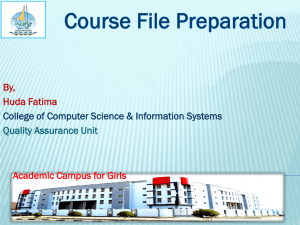New Faculty Orientation Q & A DOS
advertisement
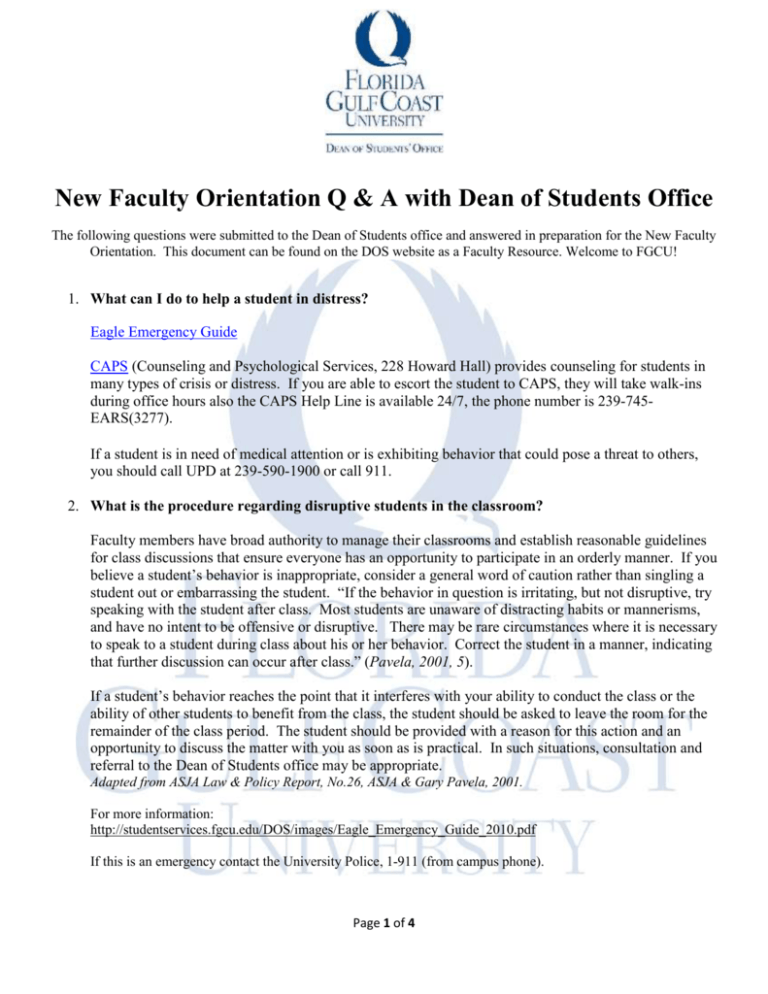
New Faculty Orientation Q & A with Dean of Students Office The following questions were submitted to the Dean of Students office and answered in preparation for the New Faculty Orientation. This document can be found on the DOS website as a Faculty Resource. Welcome to FGCU! 1. What can I do to help a student in distress? Eagle Emergency Guide CAPS (Counseling and Psychological Services, 228 Howard Hall) provides counseling for students in many types of crisis or distress. If you are able to escort the student to CAPS, they will take walk-ins during office hours also the CAPS Help Line is available 24/7, the phone number is 239-745EARS(3277). If a student is in need of medical attention or is exhibiting behavior that could pose a threat to others, you should call UPD at 239-590-1900 or call 911. 2. What is the procedure regarding disruptive students in the classroom? Faculty members have broad authority to manage their classrooms and establish reasonable guidelines for class discussions that ensure everyone has an opportunity to participate in an orderly manner. If you believe a student’s behavior is inappropriate, consider a general word of caution rather than singling a student out or embarrassing the student. “If the behavior in question is irritating, but not disruptive, try speaking with the student after class. Most students are unaware of distracting habits or mannerisms, and have no intent to be offensive or disruptive. There may be rare circumstances where it is necessary to speak to a student during class about his or her behavior. Correct the student in a manner, indicating that further discussion can occur after class.” (Pavela, 2001, 5). If a student’s behavior reaches the point that it interferes with your ability to conduct the class or the ability of other students to benefit from the class, the student should be asked to leave the room for the remainder of the class period. The student should be provided with a reason for this action and an opportunity to discuss the matter with you as soon as is practical. In such situations, consultation and referral to the Dean of Students office may be appropriate. Adapted from ASJA Law & Policy Report, No.26, ASJA & Gary Pavela, 2001. For more information: http://studentservices.fgcu.edu/DOS/images/Eagle_Emergency_Guide_2010.pdf If this is an emergency contact the University Police, 1-911 (from campus phone). Page 1 of 4 Faculty members have the primary responsibility of managing the classroom environment. Per the Student Code of Conduct, you can remove a disruptive student from your class for the day and report the removal to the Dean of Students’ Office. If disruptive behavior occurs, the student may be referred to the Office of Student Conduct and the conduct process will be initiated. Here is a link to the Student Code of Conduct http://www.fgcu.edu/generalcounsel/files/regulations/FGCU_PR4_002_Student_Code_061912.pdf This process is referred to on pages 23-24. 3. Is there a procedure regarding students who do not come to class? Students can face challenges adjusting to college life and faculty members are often in the best position to notice a change in behavior and as such should reach out to students to help determine if the student is in crisis. If you have noticed that a student is no longer attending class, you are encouraged to email the student to check in to see how they are doing. If you are still concerned about the student, you can refer your concerns to the Dean of Students’ Office Care Team for follow up, 239-590-7900 or to the CAPS Office. Attendance can affect students receiving financial aid in that if the student’s lack of attendance results in a withdrawal then the last date of attendance determines the amount of reimbursement the student will owe. 4. What is the procedure regarding cheating/academic dishonesty? Every member of the University has an ethical responsibility to promote academic integrity; faculty members in particular have a professional obligation to facilitate an environment that promotes academic integrity. To this end a discussion in class at the beginning of the semester regarding University policies of academic integrity and the importance to the University as a whole might prove beneficial in preventing incidents of cheating. When a faculty member suspects academic dishonesty it is your responsibility to communicate with the student discussing, with him or her, the factors that lead to your suspicions. Faculty must email the Office of Student Conduct, Studentconduct@fgcu.edu to determine if the student has a prior history of academic dishonesty. In the email from your University email address only, indicate in the subject line “Academic Dishonesty Inquiry”, include the student’s name and UIN. You will receive a response from a staff member within 48 hours. If the incident is a first offense, you may handle it with the student directly (if the student accepts responsibility for the incident). If the incident is more egregious or if it is a second offense, the case must be referred to the Office of Student Conduct to facilitate a formal hearing before the Academic Integrity Committee. The faculty member must provide all documentation of the alleged cheating and the course syllabus. Here is the online form to submit this information https://publicdocs.maxient.com/reportingform.php?FloridaGulfCoastUniv&layout_id=3 Page 2 of 4 For more detail on this process consult the Student Code of Conduct http://www.fgcu.edu/generalcounsel/files/regulations/FGCU_PR4_002_Student_Code_061912.pdf pages 46-50. 5. What other support resources are available for students? The majority of students entering the University are between the ages of 18 and 20, this is a time of growth and changes and some students require support and assistance during this time to be successful in college. The University offers several resources for students in the areas of academics, campus activities and personal issues. Academics: The Center for Academic Achievement (CAA) is available to assist students with tutoring and to assist with study skills, time management, and other strategies to be a successful student at the University. The Writing Center is available to assist students with drafting and finalizing papers, as well as workshops on citations and other topics to improve students’ quality of writing. Campus Activities: The Office of Student Involvement is available to inform students on registered student organizations, fraternities and sororities and programming opportunities to network and get involved on campus. The Multicultural and Leadership Development Office assists students with developing leadership skills on campus and in the community, involvement opportunities are available through Student Government and exposure to multicultural awareness and inclusion. Personal Issues: CAPS, the Career Center, Campus Recreation, Student Health Services, Prevention & Wellness and Housing & Residence Life may also be options of support for students depending on the situation. 6. What are some suggestions or strategies to build rapport with my students the first day of class? Let the students know a little bit about yourself. If you do any introduction or icebreaker activities, include yourself in the activity so that they can learn more about you as a person and as an instructor. Students, particularly first year students, tend to be intimidated by college instructors and they see them as uncaring and distant. They are used to the higher level of contact they received from their High School teachers. Providing a better sense of you and your interests makes you more “human.” Be sure to highlight your office hours and ways that students can contact you outside of class (remember, they are likely very tech savvy and communicate mainly through social media) and encourage them to do so. Learning your student’s names is also helpful. Take a look at the class registration page of the Canvas Learning Management System and try to put names together with faces before class begins and use their names frequently to reinforce memory. There are many icebreakers and “name games” available on the internet. Here are some sample links: First Day of Class Activities that Create a Climate for Learning | Faculty Focus A Classroom Icebreaker with a Lesson that Lasts Faculty Focus | Faculty Focus https://www.stcloudstate.edu/reslife/staff/documents/IceBreakers.pdf Page 3 of 4 If you have any students who appear to be distant or seem to be having trouble adjusting to college, please contact the Dean of Students’ Office Care Team from 8am-5pm, Monday – Friday at 239-5907900 DOScareteam@fgcu.edu . 7. How can I become involved with student extra-curricular activities? As a faculty member, the most rewarding way to become involved with campus activities is through advising. Each Registered Student Organization (RSO) is required to have a faculty/staff advisor. We currently have over 200 Registered Student Organizations, including major-based, cultural-based, political, media, honor societies, religious/spiritual, service/social justice, fraternities/sororities, sports and recreation, and special interest. Serving as an advisor to one of these organizations is a great opportunity to interact with students in a way that complements the experience they are having in the classroom. Student Organizations provide an environment that prepares students to live in an evergrowing, multicultural society and global community. Student Organizations serve as a medium for academic discourse, personal growth, leadership development, intercultural understanding, community engagement, and lasting friendships. For more information on Registered Student Organizations, please visit the Office of Student Involvement Website: http://studentservices.fgcu.edu/StudentInvolvement/rso.html. August 2014 Page 4 of 4
